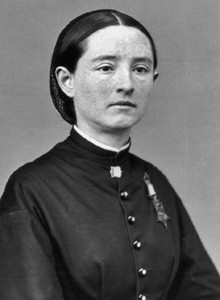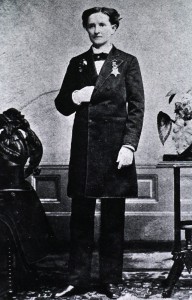
National Library of Medicine
Mary Edwards Walker was born in Oswego County, New York in 1832 and graduated as the only woman in her class from the Syracuse Medical College in 1855. At the outbreak of the Civil War in 1861, she traveled to Washington, D.C. and applied for a commission as a U.S. Army surgeon. Rejected based on her gender, she instead volunteered as a nurse at Washington’s Patent Office Hospital and journeyed to the battlefield of First Bull Run in July 1861 to treat wounded soldiers.
A non-conformist her entire life, Walker preferred to dress in more male-like attire, often wearing trousers under her calf length skirt. Refusing to allow gender to stand in her way, she continued making demands to be appointed as a surgeon. Finally allowed by Maj. Gen. Ambrose Burnside to work as a volunteer surgeon in the field, Walker treated wounded at the battle of Fredericksburg in December 1862.
The following year, Walker was in Chattanooga, Tennessee, where she tended to casualties from the battle of Chickamauga in September 1863. Following the battle, Maj. Gen. George H. Thomas, impressed by her gallant service, appointed Walker as a contract assistant surgeon in the Army of the Cumberland, assigning her to the 52nd Ohio Regiment.
In April 1864, she was captured by Confederate troops and, due to her male-looking attire, was initially charged as being a spy. She spent four months in a Richmond prison before being exchanged for a Confederate surgeon in August 1864. Within a month of her release, she was back to treating wounded soldiers around Atlanta, Georgia, following the surrender of the city.
Although she requested to continue serving in the field, Walker was instead transferred to a women’s prison hospital in Louisville, Kentucky, and later to an orphanage in Clarksville, Tennessee, where she served until the end of the Civil War.
Following the war, Walker lobbied for a brevet promotion due to her service, but was denied on the basis that she had never been a commissioned military officer. Instead, through the recommendations of Major Generals George H. Thomas and William T. Sherman, President Andrew Johnson signed an order on November 11, 1865 awarding her the Medal of Honor– the first and only woman in history to receive the award. After receiving the actual medal in January 1866, Walker wore it every day.
Dr. Mary E. Walker Medal of Honor Citation
Rank and organization: Contract Acting Assistant Surgeon (civilian), U. S. Army. Places and dates: Battle of Bull Run, July 21, 1861; Patent Office Hospital, Washington, D.C., October 1861; Chattanooga, Tenn., following Battle of Chickamauga, September 1863; Prisoner of War, April 10, 1864-August 12, 1864, Richmond, Va.; Battle of Atlanta, September 1864. Entered service at: Louisville, Ky. Born: 26 November 1832, Oswego County, N.Y.
Citation: Whereas it appears from official reports that Dr. Mary E. Walker, a graduate of medicine, “has rendered valuable service to the Government, and her efforts have been earnest and untiring in a variety of ways,” and that she was assigned to duty and served as an assistant surgeon in charge of female prisoners at Louisville, Ky., upon the recommendation of Major-Generals Sherman and Thomas, and faithfully served as contract surgeon in the service of the United States, and has devoted herself with much patriotic zeal to the sick and wounded soldiers, both in the field and hospitals, to the detriment of her own health, and has also endured hardships as a prisoner of war four months in a Southern prison while acting as contract surgeon; and Whereas by reason of her not being a commissioned officer in the military service, a brevet or honorary rank cannot, under existing laws, be conferred upon her; and
Whereas in the opinion of the President an honorable recognition of her services and sufferings should be made:
It is ordered, That a testimonial thereof shall be hereby made and given to the said Dr. Mary E. Walker, and that the usual medal of honor for meritorious services be given her.
Given under my hand in the city of Washington, D.C., this 11th day of November, A.D. 1865.
Andrew Johnson,
President
In her postbellum life, Mary Walker – not surprisingly – became very active in the women’s rights movement and crusaded for dress reform and temperance. Her insistence on wearing male attire resulted in several arrests for “impersonating a man.”

National Library of Medicine
In June 1916, in response to questions raised concerning past abuses in the awarding of the medal, the army established a review board “for the purpose of investigating and reporting upon past awards or issue of the so-called congressional medal of honor.” Composed of five retired generals, the board reviewed every award of the medal since the Civil War.
On February 5, 1917, the Medal of Honor review board released its findings. Using the criteria that only military personnel who had convincingly displayed valor in combat against the enemy were eligible for the award, the board rescinded the medals of 911 individuals, including Mary Walker. Though she had participated in several major campaigns, along with enduring four months as a prisoner of war, she was deemed ineligible for the award due to her civilian status.
Mary Walker refused to accept the board’s ruling, however, and defiantly continued to wear her medal every day for the remainder of her life. Two years later, on February 21, 1919, she died of natural causes at the age of 86.
More than fifty years later, through the lobbying efforts of a distant relative, the Army Board for Correction of Military Records reviewed Walker’s case and recommended her award be restored. On June 10, 1977, President Jimmy Carter signed an order posthumously reinstating Dr. Mary Walker as the first and only woman to receive the Congressional Medal of Honor.

Thank you for honoring Dr. Walker, one of our early female physician pioneers. I am preparing a talk for my local DAR chapter about women physicians and this information is helpful.